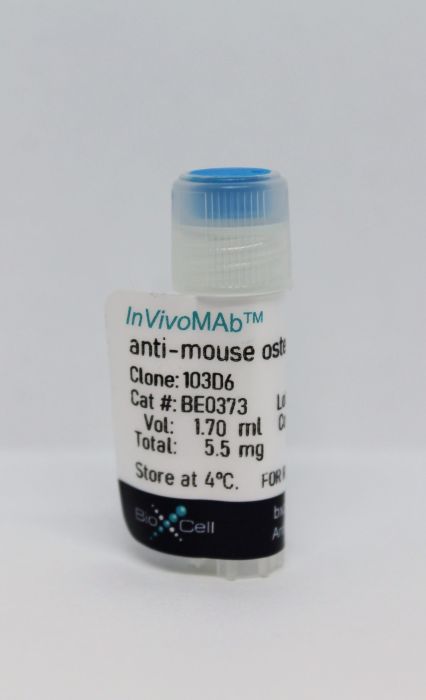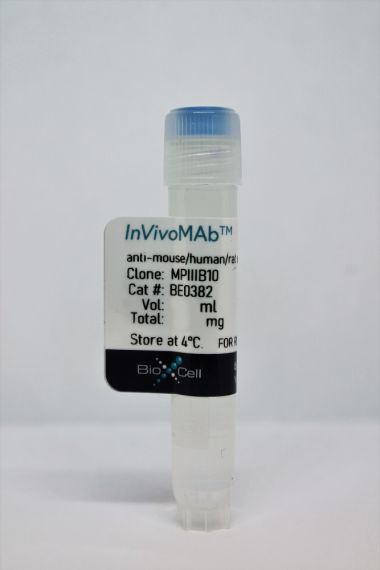InVivoMAb anti-mouse osteopontin (SPP1)
Product Details
The 103D6 monoclonal antibody reacts with mouse osteopontin (OPN), also known as SPP1. Osteopontin is a secreted arginine-glycine-aspartic acid (RGD)-containing glycoprotein that was originally isolated from bone. Osteopontin has been found in kidney, vascular tissues, biological fluids, and various tumor tissues. Osteopontin interacts with integrins and CD44 and regulates diverse biological processes including bone development, immune responses, and oncogenesis. Osteopontin is elevated in human colorectal cancer and is thought to function as an immune checkpoint. The 103D6 antibody is a blocking antibody that has been shown to increase the efficacy of tumor-specific CTLs in killing colon tumor cells in vitro and suppress colon tumor growth in tumor-bearing mice in vivo.Specifications
| Isotype | Mouse IgG2c, κ |
|---|---|
| Recommended Isotype Control(s) | InVivoMAb mouse IgG2c isotype control, anti-dengue virus |
| Recommended Dilution Buffer | InVivoPure pH 7.0 Dilution Buffer |
| Conjugation | This product is unconjugated. Conjugation is available via our Antibody Conjugation Services. |
| Immunogen | Recombinant mouse OPN protein |
| Reported Applications |
in vivo OPN neutralization in vitro OPN neutralization ELISA |
| Formulation |
PBS, pH 7.0 Contains no stabilizers or preservatives |
| Endotoxin |
<2EU/mg (<0.002EU/μg) Determined by LAL gel clotting assay |
| Purity |
>95% Determined by SDS-PAGE |
| Sterility | 0.2 µm filtration |
| Purification | Protein G |
| RRID | AB_2927510 |
| Molecular Weight | 150 kDa |
| Storage | The antibody solution should be stored at the stock concentration at 4°C. Do not freeze. |
Recommended Products
in vivo OPN neutralization, in vitro OPN neutralization, ELISA
Klement, J. D., et al. (2021). "Osteopontin Blockade Immunotherapy Increases Cytotoxic T Lymphocyte Lytic Activity and Suppresses Colon Tumor Progression" Cancers (Basel) 13(5). PubMed
Human colorectal cancers are mostly microsatellite-stable with no response to anti-PD-1 blockade immunotherapy, necessitating the development of a new immunotherapy. Osteopontin (OPN) is elevated in human colorectal cancer and may function as an immune checkpoint. We aimed at elucidating the mechanism of action of OPN and determining the efficacy of OPN blockade immunotherapy in suppression of colon cancer. We report here that OPN is primarily expressed in tumor cells, myeloid cells, and innate lymphoid cells in human colorectal carcinoma. Spp1 knock out mice exhibit a high incidence and fast growth rate of carcinogen-induced tumors. Knocking out Spp1 in colon tumor cells increased tumor-specific CTL cytotoxicity in vitro and resulted in decreased tumor growth in vivo. The OPN protein level is elevated in the peripheral blood of tumor-bearing mice. We developed four OPN neutralization monoclonal antibodies based on their efficacy in blocking OPN inhibition of T cell activation. OPN clones 100D3 and 103D6 increased the efficacy of tumor-specific CTLs in killing colon tumor cells in vitro and suppressed colon tumor growth in tumor-bearing mice in vivo. Our data indicate that OPN blockade immunotherapy with 100D3 and 103D6 has great potential to be further developed for colorectal cancer immunotherapy and for rendering a colorectal cancer response to anti-PD-1 immunotherapy.
- Mus musculus (House mouse),
- Cancer Research
Inhibition of ERK1/2 signaling prevents bone marrow fibrosis by reducing osteopontin plasma levels in a myelofibrosis mouse model.
In Leukemia on 1 May 2023 by Bianchi, E., Rontauroli, S., et al.
PubMed
Clonal myeloproliferation and development of bone marrow (BM) fibrosis are the major pathogenetic events in myelofibrosis (MF). The identification of novel antifibrotic strategies is of utmost importance since the effectiveness of current therapies in reverting BM fibrosis is debated. We previously demonstrated that osteopontin (OPN) has a profibrotic role in MF by promoting mesenchymal stromal cells proliferation and collagen production. Moreover, increased plasma OPN correlated with higher BM fibrosis grade and inferior overall survival in MF patients. To understand whether OPN is a druggable target in MF, we assessed putative inhibitors of OPN expression in vitro and identified ERK1/2 as a major regulator of OPN production. Increased OPN plasma levels were associated with BM fibrosis development in the Romiplostim-induced MF mouse model. Moreover, ERK1/2 inhibition led to a remarkable reduction of OPN production and BM fibrosis in Romiplostim-treated mice. Strikingly, the antifibrotic effect of ERK1/2 inhibition can be mainly ascribed to the reduced OPN production since it could be recapitulated through the administration of anti-OPN neutralizing antibody. Our results demonstrate that OPN is a novel druggable target in MF and pave the way to antifibrotic therapies based on the inhibition of ERK1/2-driven OPN production or the neutralization of OPN activity. © 2023. The Author(s).





